
Riot Round-Up: The Best Books We Read in October
We asked our contributors to share the best book they read this month. We’ve got fiction, nonfiction, YA, memoir, and more. Some are old, some are new, and some aren’t even out yet. Enjoy, and please tell us about the highlight of your reading month in the comments.
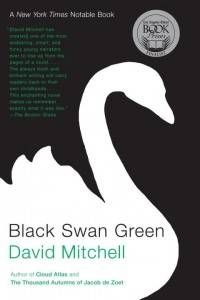 Black Swan Green by David Mitchell
Black Swan Green by David Mitchell
I’ve seen Mitchell’s coming-of-age tale, set in a small English village circa 1982, hailed as a contemporary Catcher in the Rye, and although I understand the comparison (the narrators’ voices and a certain authenticity of adolescent experience definitely overlap a bit), I think it actually kind of sells Black Swan Green short. For one, Mitchell’s novel covers a year in the life of its protagonist rather than a day, which allows Mitchell to plumb the depths of pubescent fear and anxiety to a degree I don’t know I’ve ever seen in a novel. Young Jason Taylor, like so many thirteen year-olds, finds the actions of his peers and the adults in his life indecipherable much of the time. The novel’s excellence rests in the honesty with which Mitchell paints this uncertainty, about girls, about his parents’ dissolving marriage, about his classmates’ shifting allegiances, and about the troubling social and political climate of Thatcher’s Britain. Adolescence is mostly confusion about who we should be and how to go about making ourselves into that person. Black Swan Green throws that idea under a microscope and examines it enough tenderness to make you wish you’d had a book just like it when you were Jason Taylor’s age. –Josh Corman
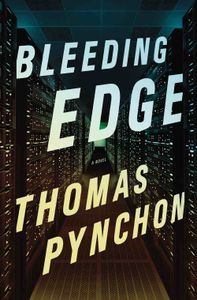 Bleeding Edge by Thomas Pynchon
Bleeding Edge by Thomas Pynchon
It’s nearly impossible to sum up a Pynchon novel in one paragraph, because there’s always going to be another “Oh yeah, and there’s also…” So I won’t really try, suffice it to say that this is a novel about New York City at the beginning of this millenium. Which means it involves the fledgling internet, Jennifer Aniston, and the Eleventh of September. To his credit, I think that Tom wrote about 9-11 exactly how he needed to. He didn’t play it like a gimmick, or like a set piece. It was part of his characters’ stories, and it happened to them. Like most of Pynchon’s work, Bleeding Edge is a detective novel. And, like most of Pynchon’s work, there’s no immediate resolution (if any), and there are LOTS of red herrings. But I found this to be one hell of a satisfying read. In his old age, Tom hasn’t lost a bit of his ribald style. He has, however, grown a bit more sentimental: In amongst the chase scenes, the sex jokes, the word play, and paranoia that come standard within Pynchon’s covers, there was also a lot of heart. I cared about Maxine, the novel’s heroine. And I cared about the characters Maxine cared about. With writers like Roth and Munro stepping away from the keyboard, I’m cherishing every last word that Pynchon (76) writes. I hope this isn’t his last novel, but if it is, it’s certainly a high note. –Casey Peterson
 The Bridge by Rebecca Rogers Maher
The Bridge by Rebecca Rogers Maher
As I said in my last Buy, Borrow, Bypass post, The Bridge is on my shortlist of favorite books of the year. It’s basically a romance about two people who are suicidal, but it’s neither sappy nor depressing. Instead, it’s hopeful and optimistic. In tone, it reminded me of a modern When Harry Met Sally, not least because it’s also a love letter to the city of New York. The main characters, Henry and Christa, are sympathetic, have great chemistry, and their story is incredibly compelling. “The bridge” isn’t just the location of Henry’s and Christa’s suicide attempts, but a metaphor for having the courage to make connections with other people and move forward from the bad things that happen in life. I found this novella to be inspiring, unputdownable, and incredibly romantic. Read it! -Tasha Brandstatter
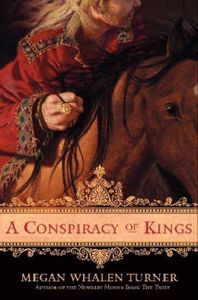 A Conspiracy of Kings by Megan Whelan Turner
A Conspiracy of Kings by Megan Whelan Turner
Once again, I’m late to the game. Call it further proof that when you’re starting a new author, there’s nothing wrong with jumping into the last book of the series. And also that really good writing and a complex plot can win over a totally-non-fantasy-fan like me. (It’s a short list: Kristin Cashore, Jennifer A. Nielsen, and now Turner.) -Sarah Rettger
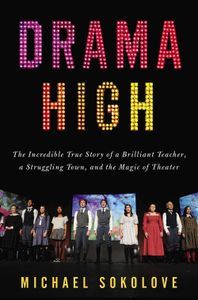 Drama High by Michael Sokolove
Drama High by Michael Sokolove
The cover copy for this book described it as Friday Night Lights meets Glee, which is surprisingly accurate. For 40 years, Truman High School drama director Lou Volpe transformed his high school students into talented actors and actresses, pushing his students to take on difficult subjects and challenging scores. In the process, Volpe helped put Levittown, Pennsylvania, a former manufacturing town struggling in a new economy, on the map. Drama High is a beautiful and inspiring tribute to a teacher of immesurable grace and influence that I adored. –Kim Ukura
 Fangirl by Rainbow Rowell
Fangirl by Rainbow Rowell
I get interested in the subjects that are talked about in the books I read. I google things, check out wikipedia when I want more information. It is rare, however, that I go any further than that. After reading Fangirl, I spent the next two nights staying up to read Harry Potter fanfic about the drama that comes with being a pregnant teen at Hogwarts when your parents are Ron and Hermione. And I liked it. I only wish that I had been able to read the Simon Snow novels, so I’d get why Cath’s fanfic masterpiece is such a big deal. I want to be her beta. –Cassandra Neace
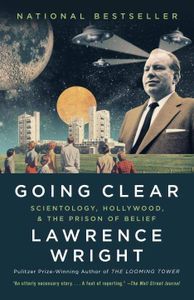 Going Clear: Scientology, Hollywood, and the Prison of Belief by Lawrence Wright
Going Clear: Scientology, Hollywood, and the Prison of Belief by Lawrence Wright
This comprehensive investigation of Scientology’s origins, evolution, and place in contemporary culture is mindblowing on so many levels. Wright presents the background on how L. Ron Hubbard thought up the principles behind Scientology and how he sold such crazy-sounding ideas to thousands of devoted followers who literally signed their lives over to him in a billion-year contract (genius mixed with charisma is a dangerous thing). There are even more conspiracies and scandals than I expected, but there’s a whole lot of cruelty and heartbreak and manipulation as well. Wright is not poking fun at people who believe silly-seeming things; he is exposing a powerful group that routinely and systematically abused and took advantage of its members. That he carried out this research, interviewed hundreds of insiders, and published his findings (essentially that Scientology is founded on lies) in the face of one of the most litigious and intimidating religious groups in history is a testament to his courage, and this is an important and illuminating book. –Rebecca Joines Schinsky
 The Goldfinch by Donna Tartt
The Goldfinch by Donna Tartt
It’s no surprise that Donna Tartt’s newest novel towers above anything else I read in October. The Goldfinch is a modern David Copperfield (with way more drug use), totally epic and hosting a slew of unforgettable secondary characters. Suspense! Love! Art heists (sort of)! Las Vegas! And like the Dickens, it’s a door-stopper of a read- perfect for hunkering down with as the weather gets cold. –Amanda Nelson
 The House of Hades by Rick Riordan
The House of Hades by Rick Riordan
I’m halfway through Rose Under Fire, Elizabeth Wein’s companion novel to Code Name Verity, and while I’m loving it and finding the writing to be lovely, for a gal whose inner child is a ten-year-old mythology nerd, it doesn’t get much better than Rick Riordan. Annabeth and Percy must make their way across Tartarus, while Nico, Hazel, Piper, Jason, Frank, and Leo must travel across the world. The group’s goal: close the Doors of Death from the Underworld side and the Mortal side so that Gaea’s forces are unable to keep escaping from Tartarus. Riordan’s writing is as fun as ever, and he reveals both subtle details and major developments for several of the characters. We meet Hecate. So much crazy stuff happens! I devoured these 600ish pages in two days, and now I can hardly wait for the final book in the series, The Blood of Olympus, out next fall. –Jeanette Solomon
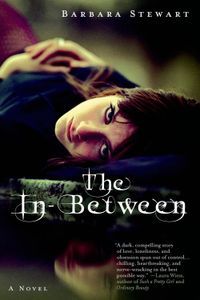
The In-Between by Barbara Stewart (St. Martin’s Griffin, November 5)
Stewart’s novel is a complex novel blurring the lines between mental illness and the supernatural. When 14-year-old Ellie, her parents, and her cat were in a horrible car accident on their move from Pennsylvania to New York, what had been meant to be a fresh start for the family turns out not to be so. That is, until Ellie meets Madeline and embarks on a friendship with the kind of girl she always wanted to be. Maddie is stylish, fun, a little bit wild and uninhibited. But it becomes more than a friendship. It becomes Ellie’s obsession. All she can think about is Maddie and all she wants to do is embody Maddie’s spirit.
The writing is crisp and tight, and Stewart does an excellent job offering up a host of questions and rewarding the reader with few –if any — answers. Has Ellie created Maddie out of her own madness or is Maddie a real person? Is there something more sinister going on in Ellie’s world that we aren’t aware of? Was it the result of the car accident or did this start long before? The In-Between is a satisfyingly dark, creepy, and twisted tale. -Kelly Jensen
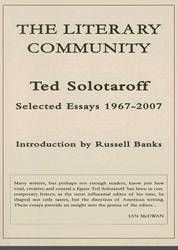 The Literary Community: Selected Essays 1967-2007 by Ted Solotaroff
The Literary Community: Selected Essays 1967-2007 by Ted Solotaroff
Scanning the $4.95 bargain shelf at the Barnes & Noble in Wichita, Kansas, could be the considered the book-buying equivalent of dumpster diving (which isn’t to say I don’t love the Barnes & Noble in Wichita—please, please stay open, Barnes & Noble in Wichita!—we need you!). Recently visiting family back in my hometown, I discovered this collection of Solotaroff’s essays. I knew of Solotaroff only because of his outstanding essay, “Writing in the Cold,” about fiction writers struggling in the post-MFA years, and I bought this collection based on that essay (which is included). This book is so good in its examination of the aesthetics of fiction writing that I hesitate to include it here because part of me doesn’t want other writers to discover it. But you don’t have to be a writer to enjoy this book. If you’re a fan of serious literary fiction, buy this book now. (And don’t just take my word for it—the book is blurbed by Ian McEwan and has an intro by Russell Banks.) -Loyal Miles
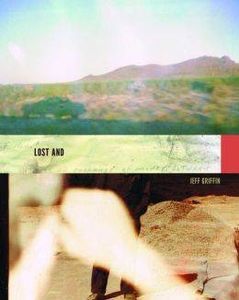 Lost And by Jeff Griffin
Lost And by Jeff Griffin
Lost And is an entirely, purposely uncategorizable little book, although the back cover tentatively places it as belonging to “poetry/art.” I would agree with that. Jeff Griffin has carefully collected and preserved remnants of strangers’ lives in abandoned desert towns of California and Nevada, from oddly personal feeling photographs to pain-filled teenage poetry to a woman’s distraught letters to her abusive lover. The book contains no words from Jeff Griffin himself, with the exception of half a sentence at the very beginning, explaining the first included work–a dictionary of words and phrases somebody’s bird has been learning, a bold first inclusion, but also a strangely delightful one. The whole thing is delightful, really, as much as it is terribly, disturbingly sad. I love that Griffin lets it all speak for itself, the documents of desperate, lonely people, although by the end you realize that it has all been arranged in the book by Griffin in a thoughtful, deliberate way. Along these lines, I could have done without most of the slightly pretentious afterward by Mark Levine, except for the insight into Griffin’s life and process he includes, and the keen observation that there are no scenery shots included here, no pictures of the trailers and towns where Griffin found these artifacts. “This is not an experience of sightseeing; it permits, and demands, an identification with the humanity of the people it discovers.” –Jill Guccini
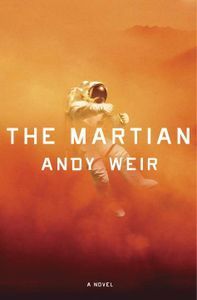 The Martian by Andy Weirs (Crown, February 11, 2014)
The Martian by Andy Weirs (Crown, February 11, 2014)
Oh my stars and garters, I loved this book! It’s hard not to love a book that starts out “I’m pretty much fucked.” Six days prior to the start of the book, Mark Watney had been one of six astronauts on on Mars. But when a horrible dust storm on the planet ruins their mission, Mark is accidentally left behind when the rest of the crew think he’s dead. Now he’s keeping a journal, detailing his experiences on the red planet, fully aware that his chances of living on Mars are zero. This book is full of crazy, ingenious ideas Mark thinks up to survive (you don’t get to fly on a mission to Mars by being a dummy) balanced with a lot of really funny bits, and (cue the echo effect) SPACE ACTION-action-action. And I have to say, sitting around alone in your jammies, eating baked potatoes and watching Three’s Company reruns doesn’t sound that bad. Mad love for The Martian. Homework: Go read The Martian Chronicles by Ray Bradbury while you’re waiting for this one to come out, because there is never not a time to read The Martian Chronicles. –Liberty Hardy
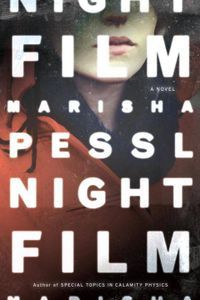 Night Film by Marisha Pressl
Night Film by Marisha Pressl
Night Film is a 600 page book that I read in two days. I adored about 500 pages of it and felt like they were written with me in mind. The plot involves a disgraced journalist and his growing obsession with the beyond-reclusive film director Stanislas Cordova, who makes Kubrick look as cozy and aw-shucksky as Maeve Binchy.
The novel opens with the death of Cordova’s daughter, which puts the journalist back onto a case he had thought was closed long ago. It then spirals out into black magic, the super-fan Cordovites, the whereabouts of the director, one of those wilderness treks/camps for wayward youth, some truly creepy set pieces, and more and more and more. I liked the story but enjoyed the mood even more. The ending was far less satisfying than the first 500 pages, but so what, I had a great time. I’ve heard some whiners saying this book is nothing but gimmicky pulp. I say that if what I’ve written makes it sounds interesting at all, you’ll know within five pages whether it’s for you or not. -Josh Hanagarne
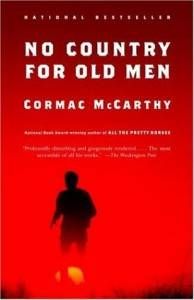 No Country for Old Men by Cormac McCarthy
No Country for Old Men by Cormac McCarthy
This was my first McCarthy novel. I think I was intimidated by the sheer number of great McCarthy works out there. My first experience did not disappoint. I’d seen the movie, so I knew the plot, and yet, I was sucked in from page one. How does that happen when you know the story? It happens when the writing is so great that you just can’t help it. The way McCarthy weaves a page-turning thriller in with stunning literary prose is masterful. Also, Sheriff Bell is one of my new favorite characters in all of bookdom. –Jeremy Anderberg
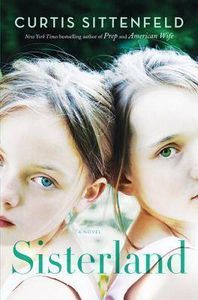 Sisterland by Curtis Sittenfeld
Sisterland by Curtis Sittenfeld
Let’s talk about the elephant in the room right away. The star of Curtis Sittenfeld’s Sisterland is a boring, anxiety-plagued stay-at-home mom in the St. Louis burbs. If that’s not going to work for you, there’s no point trying to talk you into it. For the rest of you, I think that’s why I crush so hard on Curtis Sittenfeld’s writing. She makes the quietest lives feel so full; the most ordinary desires feel gigantic. But let’s also talk about what’s not ordinary about Sisterland. Psychic twins. (Psychic twins!!!) Natural disasters. Junior high schoolers with Ouija boards. Bitchy best friends. Suicidal moms and stoic dads. Daytime TV stars and fancy LA publicists. I love the way Sittenfeld takes so much drama and makes it feel so accessible and familiar. I also don’t think she’s gotten enough credit, in Sisterland, for the elegant way she manipulates time and keeps thrusting the story forward toward the edge of the cliff. I listened to the audiobook read by Rebecca Lowman, and she so totally nailed the smallness and the enormity of the internal lives of a Midwestern family thrown into an irrevocable disaster. –Rachel Smalter Hall
 A Slight Trick of the Mind by Mitch Cullin
A Slight Trick of the Mind by Mitch Cullin
The news that Ian McKellen would be playing an old Sherlock Holmes in a movie called A Slight Trick of the Mind was pretty exciting all by itself. Who doesn’t want to see Ian McKellen play Sherlock Holmes? (bad people. That’s who) However, it handily coincided with a massive Sherlock Holmes fixation on my part, and so I wasted no time in getting a copy of the book by Mitch Cullin. It is the story of a 93-year-old Sherlock Holmes, retired and beginning to lose his amazing mental faculties. The book moves between Sherlock recalling his visit to Japan, shortly after the end of World War II, Sherlock’s days around his country estate, and his ruminations on a case that he never quite solved, from long ago. This is a literary exploration of an old and once-remarkable man, more than it is the fast-paced detective fiction you might expect from a Sherlock Holmes story, but it is beautiful and sad and a wonderful book. I have absolutely no idea how they’re going to make it a compelling movie, but I’m not worried. It’ll be Ian McKellen as Sherlock Holmes. That’s good enough for me. –Peter Damien
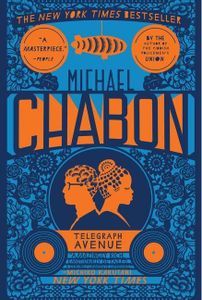 Telegraph Avenue by Michael Chabon
Telegraph Avenue by Michael Chabon
Funky, free-wheeling, and fun, Chabon’s latest novel is both a tribute to nostalgia and a reminder that, ultimately, nostalgia is a gaping black hole. In Telegraph Avenue, we find a used vinyl records store owned by an African-American and a Jew, and their wives who run a private midwifery clinic. When a mega-super-Walmart-ish store threatens to destroy the record business, when a long-lost son shows up unannounced, when a father blackmails a city councilman, and when the midwives get threatened with a lawsuit that could destroy their clinic, well…you get the idea. Telegraph Avenue is slangy and sober, rich and riotous. And did I mention the 12-page-long sentence in the middle? Oh boy. –Rachel Cordasco
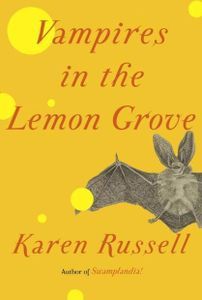 Vampires in the Lemon Grove by Karen Russell
Vampires in the Lemon Grove by Karen Russell
Perfect for this time of year is a collection of weird, wryly funny, effortlessly imaginative and exquisitely written stories by a 2013 MacArthur award winner who is only 32. It makes me want to bite into a lemon with jealousy. Not to be her, but to be her mother. I’d kvell in Yiddish and be verklempt: My daughter she’s a genius. Russell is a master crafter. Hitchcockian. Reeling for The Empire is a Poe-ish Kafka-esque freak-gem to be savored with all the kids’ leftover KitKats, except in my house there is no such thing. –Elizabeth Bastos
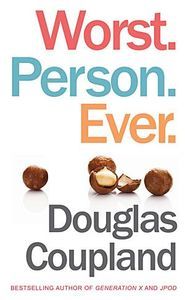 Worst. Person. Ever. by Douglas Coupland
Worst. Person. Ever. by Douglas Coupland
It’s not the most literary book I read this month, and it doesn’t have the depth or spiritual questioning of Coupland’s usual projects, but hot damn is this book ever fun. Coupland’s usually restrained prose is crude and rough, volatile and surprising. You will hate Raymond Gunt — the eponymous Worst. Person. Ever. (yes, said just like Comic Book Guy) of the title — but you will slowly also come to love him. Which will in turn make you hate yourself just a little. Coupland is at his unique best when he’s challenging himself, and this novel is certainly a step away from his comfort zone. But he nails it. And oh, oh, oh how you will laugh. –Brenna Clarke Gray
____________________________
Sign up for our newsletter to have the best of Book Riot delivered straight to your inbox every week. No spam. We promise.
To keep up with Book Riot on a daily basis, follow us on Twitter, like us on Facebook, and subscribe to the Book Riot podcast in iTunes or via RSS. So much bookish goodness–all day, every day.










